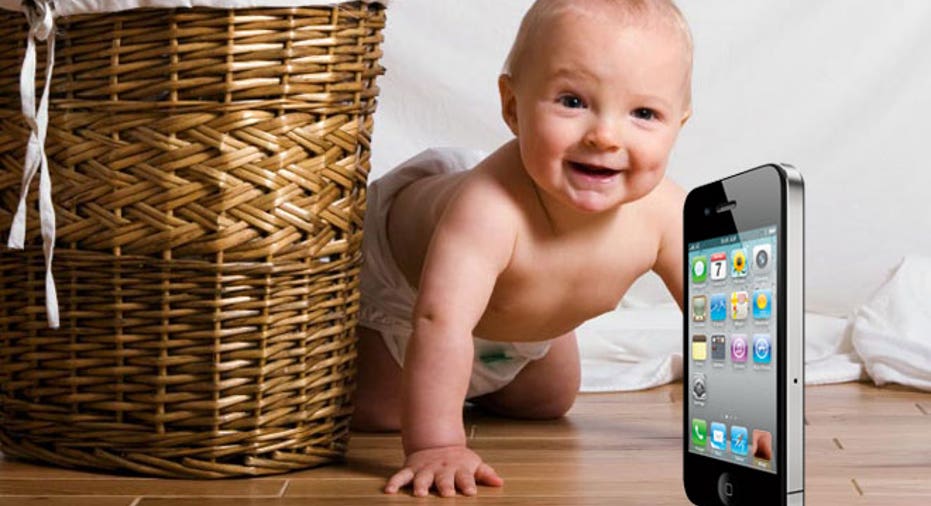What Apple Babies Reveal About Our Tech Routines

As part of an experiment for my forthcoming book Brandwashed, I lined up 20 babies between the ages of 14 and 20 months. I then handed each one a BlackBerry. No sooner had their soft chubby fists reached out to take the phone from me than they touched the screen expecting it to light up. When nothing happened, a few stuck it in their mouths whilst others moved on to something more interesting.
Keep up with the latest in technology with the FOX Business Tech Facebook page.
These babies, all under two years old, have already been converted to the Apple brand.
It does not stop with phones. If you place a toddler in front of a TV screen, chances are they will run their little fingers over the screen expecting the channel to change. Some are even more advanced, moving their fingers in such a way as to expand the screen to explore the finer details.
A whole new generation is being primed in their most formative years to think Apple. It's fascinating the way these new technology rituals have entered our lives. And they are replacing old rituals.
Consider this. You've just had a dream holiday. The trip was amazing: great friends, new adventures, fun-filled evenings, and perfect weather. It couldn't be better. But, as the clich� goes, all good things come to an end. You come home, turn on the computer, and find yourself right back in the center of reality. There is an inbox full of emails that need to be answered. There are forgotten deadlines with red "priority" flags. There are bills and notes, and a to-do list that just keeps getting longer.
But there's something missing. You've probably forgotten it by now, but it used to be an important part of any holiday--the expectation of photos. Remember when you'd go down to a local store and hand over your reels of film? Then there was the wait. A day or two later, you'd go back to collect your prints. How many times did you stand in the store, tear open the envelopes, and flick through the photographs still smelling of the chemicals used to develop the images. Precious mementos of a glorious time contained in that single envelope of prints and negatives.
This ritual is well and truly gone.
We have become a bunch of impatient snappers who shoot hundreds and hundreds of photographs. Just seconds after we've clicked the shutter (and yes, I mean seconds), we give the display a quick glance, get our moment of gratification, and move on. There's no delay--no waiting, no anticipating--the ritual is as dead as the proverbial Kodak moment.
Many years ago, Guinness, the great Irish brewery, released a slogan which stated "Good Things Take Time." They realized people had grown more impatient. But the wait was important because their stout required time to pour, and as importantly, time to settle. Today, some 20 years later, Guinness Beer is thriving. People will patiently wait while the bartender goes through the rigorous 10-minute ritual of pouring the beer, layer by layer, in order to enjoy the perfect pint.
The average American undertakes approximately 170 rituals a day--from shaking hands to picking up their cup of Starbucks. And even though no one gives them a thought, these rituals add up and shape our daily lives. What's interesting is that the number is steadily increasing. People have added, on average, six new rituals to their portfolio over the past four years. The more stress we feel, the more rituals we carry out.
Rituals create an artificial space around us where we feel safe from our everyday pressures. Trouble at work, trouble with relationships, and trouble with children all add up to us searching for more rituals to keep our anxieties at bay. Take time to observe professional athletes as they prepare for a big race. They are usually engaged in one ritual after another in an attempt to minimize failure and create a positive place for success. However, you don't need to go much further than surface level to see that the types of rituals we undertake today have changed. All those that involve building anticipation have been replaced with our need for instant gratification--like viewing a photograph within moments of taking it.
Rituals are immensely powerful from a branding point of view (although surprisingly few brands really get how powerful they are). It's time for all of us to introduce a big dose of patience into our lives, into our routines, and of course, into our brands. Numerous studies show that it's the anticipation we enjoy the most. Looking forward to a vacation tends to be more rewarding than the actual trip. Planning to buy the latest camera, with its improved features and functions, is a whole lot more exciting than using it. Yet, for some reason we've skipped anticipation, opting instead for instant gratification. Sadly, along the way we've slowly and unknowingly killed many invaluable rituals which once defined our lives. They now seem odd and outdated. The question is: Were the rituals really that outdated? Or have we become too demanding?
This content was originally published on FastCompany.com
 More news from Fast Company: - Meet The Adorable Recycling Robot - A Table Designed To Teach Kids To Grow Their Own Food - If Humans Evolve Into High-Tech Coral Fish, This Is Where We'll Live
More news from Fast Company: - Meet The Adorable Recycling Robot - A Table Designed To Teach Kids To Grow Their Own Food - If Humans Evolve Into High-Tech Coral Fish, This Is Where We'll Live



















